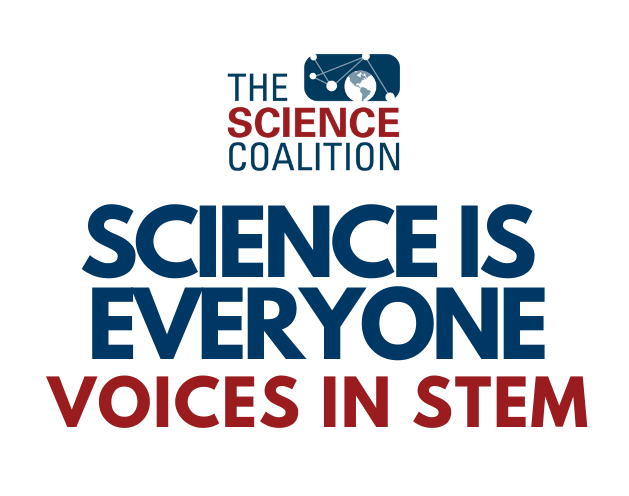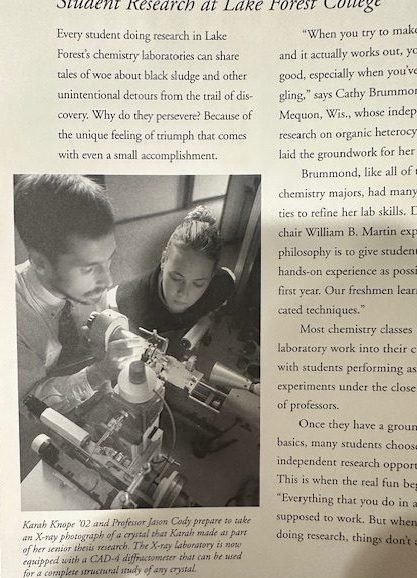
Dr. Karah Knope, a Provost's Distinguished Associate Professor at the Georgetown University, joined The Science Coalition to celebrate National Chemistry Week and discuss her groundbreaking research in critical material and heavy element chemistry.

From Crystal Curiosity to Cutting-Edge Chemistry: Dr. Karah Knope's Journey in STEM
Dr. Karah Knope's fascination with science began in a second-grade classroom, where she first grew crystals for a science project. Little did she know that this childhood curiosity would blossom into a career at the forefront of rare earth and heavy element chemistry, with potential impacts on nuclear energy and critical materials sustainability. Now a Provost’s Distinguished associate professor at Georgetown University, Dr. Knope's research focuses on the fundamental properties of lanthanides and actinides - elements at the bottom of the periodic table that play crucial roles in energy technologies and nuclear processes.
The Power of Mentorship
Throughout her journey, Dr. Knope has been shaped by influential mentors. From her undergraduate days at Lake Forest College to her graduate studies at George Washington University, mentors like Jason Cody and Chris Cahill not only nurtured her scientific curiosity but also instilled in her the importance of mentorship. However, it was during her three-year gap between undergraduate and graduate studies that Dr. Knope’s passion for inorganic chemistry truly crystallized.
During this pivotal period, Dr. Knope gained diverse experiences that solidified her interest in the field. She spent time at Cedars Sinai in Los Angeles, engaging in animal research. She also enjoyed a stint at the University of Vermont in a biochemistry lab, focusing on blood coagulation. These varied experiences taught Dr. Knope the value of exploring different facets of scientific research. She learned that trying out various fields and approaches can lead to unexpected insights and help refine her scientific interests. Each mentor and laboratory environment contributed unique perspectives, techniques, and knowledge that ultimately guided Dr. Knope toward inorganic chemistry.
Dr. Knope conducting research with mentor, Dr. Jason Cody at Lake Forest College during her undergraduate career.
Impactful Research
Dr. Knope’s research focuses on lanthanides and actinides – two groups of elements that play crucial roles in modern technology and energy production. Lanthanides -- like neodymium, dysprosium, and europium -- are also known as rare earth elements. They’re essential components in many green energy technologies, including wind turbines, electric vehicles, and energy-efficient lighting. Despite their name, these elements are not particularly rare in the Earth’s crust, but their extraction and separation can be challenging and environmentally costly. On the other hand, actinides – like uranium and plutonium -- are radioactive elements that are central to nuclear energy production and pose significant challenges in waste management and environmental remediation.
"Lanthanides and actinides have an outsized role in the modern world," Dr. Knope explains. "But the global supply chain of lanthanides is concentrated in just a handful of countries, which raises serious concerns about resource security and long-term sustainability. For the actinides, our understanding lags that or the rest of the periodic table. As researchers, we're constantly working to address these challenges and unlock the full potential of these remarkable elements."
Dr. Knope's lab is addressing these challenges through three main research projects:
- Lanthanide Separation and Sustainability: Funded by the Department of Energy, this project aims to develop more efficient and sustainable methods for separating rare earth elements. The goal is to improve domestic supply chains for these critical materials, reduce dependence on foreign sources, and minimize the environmental impact of extraction processes.
- Bismuth-Based Novel Materials: This National Science Foundation-funded project explores the potential of bismuth, an element that shares properties with lanthanides but is cheaper and nontoxic. Dr. Knope's team is investigating the use of bismuth for lighting and sensor applications. This work could lead to more sustainable alternatives to current rare earth-based technologies.
- Actinide Chemistry and Nuclear Waste Management: This research focuses on understanding the fundamental chemistry of actinides, particularly in the context of nuclear waste management. By studying how these elements behave in various conditions, Dr. Knope's team hopes to improve the processing and storage of nuclear waste, addressing a key challenge in the nuclear energy lifecycle.
These three research projects are addressing some of the most pressing challenges in environmental science, sustainable energy, and nuclear safety – with potential far-reaching impacts on global energy security and technological advancement.
Inspiring the Next Generation
Dr. Knope's passion for science education extends beyond her university role. She helps organize the National Crystal Growing Competition for K-12 students, bringing her childhood love of crystals full circle to inspire the next generation of scientists.
"Crystals are everywhere," Dr. Knope said. "They're the most accessible piece of chemistry, and they can spark a lifelong love of science."
From a second-grade science fair to the forefront of rare-element chemistry, Dr. Karah Knope's journey exemplifies the power of curiosity, mentorship, and federally funded research in advancing scientific discovery. Her work not only pushes the boundaries of chemistry but also paves the way for a more sustainable and energy-efficient future.


